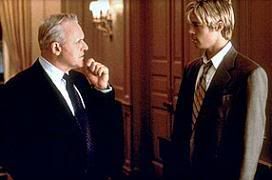The Wise And The Simple
When the child chatters away, his chatter is perhaps simple enough, and when the wise person says exactly the same thing, it has perhaps become the most ingenious of things.
This is how the wise person relates himself to simplicity. When he enthusastically venerates it as the highest, it honors him in turn, because it is as if, in him, the simple became something else, even though it in fact remains the same.
The more the wise person considers simplicity, then, ... the more difficult it becomes for him.
Kierkegaard, Concluding Unscientific Postscript

My wife and I recently watched a film about the life of a London art mueseum curator. He is so loathed by his coworkers for his simple, primitive ways that they will do anything to get rid of him.
A speaking invitation from southern California arrives requesting an art expert to give a speech. The occasion is the reception of a famous portrait from overseas. The museum staff sends the simple curator, because they consider him an annoyance.
The painting depicts whistler's mother. She sits in her colonial American garb looking to the left of the frame while casually rocking.
When the curator -who is a very simple man- stands up to give to give the speech everyone expects to hear him talk about the ideology behind the work or the technique of the artist.

The curator begins:
'My job is to go around ... and look ... at the paintings.'
Everyone is amazed. To just go around and look at the paintings? How primitive and yet how profound.
He continues in a similar way. Toward the end he says,
'This artist decided to paint a picture of his mother. Even though she was an old homely woman he still decided to paint her picture ... and I think that is marvelous.'
If a child had stood up and spoken in such a way, he would probably have been disregarded.
A sympathetic adult might have said to such a child, 'Your words were all very nice, but let us hear what wonderful things you'll have to share after you've studied art history.'
But when the simple man came and spoke simply under the banner of wisdom, everyone was amazed.
Jesus told his disciples that no one would enter life unless they made themselves to be like little children.
Consider a trained theologian who addresses other theologians and says, 'Jesus loves me, this I know, for the Bible tells me so'. His words seem very different from the words any child might say at Sunday school, and yet couldn't they be the same words?
Cannot we all become like little children?
Labels: Childhood, Kierkegaardia
Read More ...









